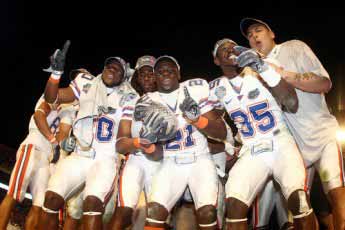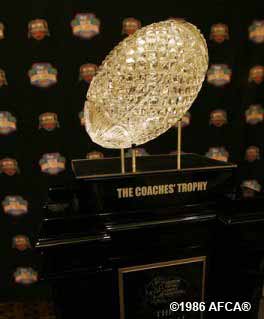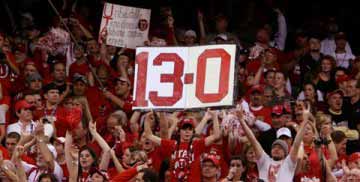History of College Football Playoffs

(click to enlarge image)
The Florida Gators celebrate winning the BCS National Championship for the 2008-2009 season on Jan. 8, 2009.
Source: Orlando Sentinel website (accessed Nov. 13, 2009)
The Bowl Championship Series (BCS) was formed in 1998 to pit the top two BCS-ranked college football teams against each other in a national championship while eight other top teams play in four bowl games.
Many football fans argue that a playoff system should replace the BCS. They contend that it is the only fair way to determine a national champion and that the BCS method is subjective, profit-motivated, and sometimes leaves the best teams out of the championship game.
Opponents argue that the BCS system is in the best interest of the athletes, fans, and sponsors because the bowl games generate huge profits for schools and their local economies, keep the season shorter for student athletes, and almost always have the two best teams playing each other for the national title.
43% of Americans say that football is their favorite sport to watch, more than three times any other sport. In 2008, a record 37.5 million people attended college football games. 120 colleges and universities compete in 34 post-season bowl games, and one of the schools (and sometimes two) is crowned national champion each year.

(click to enlarge image)
The National Championship trophy awarded to the winning coach is made from Waterford Crystal and is valued at $30,000.*
Source: Orlando Sentinel website (accessed Nov. 13, 2009)
 (1.3 MB) , the best college football team has been determined by media polls, coaches polls, and mathematical rating systems but never a playoff system. (1.3 MB) , the best college football team has been determined by media polls, coaches polls, and mathematical rating systems but never a playoff system.
The Bowl Championship Series (BCS), a self-described "five-game arrangement for post-season college football," is a system that ranks teams and matches the top two in the national championship game to determine the national champion. The annual controversy about whether the BCS should be replaced by a playoff system centers on the BCS rankings (also called standings). The BCS standings are calculated by averaging three elements: the Harris Intercollegiate Football Poll, the USA TODAY Coaches' Poll (which replaced the Associated Press Poll in 2005), and the average of six computer rankings. Proponents of the BCS say their rankings are as accurate as possible because the BCS incorporates human polls and computer ratings to calculate the standings, but critics counter that the BCS rankings often place teams in the wrong order and discriminate against smaller schools.
The number one and number two teams, selected by the various polls and ratings used over time, played each other in bowl games eight times out of 57 seasons (14%) between 1936 and 1992, when the first bowl coalition (a bowl agreement preceding the BCS) began. Since the creation of the Bowl Championship Series, the top two teams according to the AP poll have met eight out of 11 seasons (73%), a fact that the BCS proponents consider to be evidence that the system is working.

(click to enlarge image)
USC fans show their support for a playoff system.
Source: Los Angeles Times website, Nov. 23, 2008
Six conferences (ACC, Big 12, Big East, Big Ten, Pac 10, SEC) plus the University of Notre Dame had existing bowl agreements before the BCS was formed in 1998, so the BCS rules were written to guarantee automatic entry into BCS bowl games for the champions of those six conference. Schools in those conferences are called BCS teams, while schools in the five conferences that are not guaranteed a BCS spot are referred to as non-BCS teams. A non-BCS team can earn a spot in a BCS bowl game by finishing in the top 12, or if it is ranked in the top 16 and ranked higher than at least one team from a BCS conference.
From 1998-2008, nine undefeated teams were excluded from the BCS National Championship game while teams with one or more losses were included. Eight of those nine teams were non-BCS schools; the one time an undefeated BCS school (Auburn University) was not selected for the national championship game was in 2004 when two other BCS schools (USC and University of Oklahoma) were also undefeated. A non-BCS team has never played in the national championship game in the history of the Bowl Championship Series, and out of the 47 BCS bowl games played since 1998, non-BCS teams have played four times.

(click to enlarge image)
University of Utah fan boasting that the Utes were the only undefeated team in 2008. The Utes finished 6th in the BCS ranking.
Source: New York Times website (accessed Nov. 19, 2009)
Congressman Joe Barton (R-TX) introduced the College Football Playoff Act of 2009  on Jan. 9, 2009 to make it illegal to promote, market, or advertise a post-season game as a championship or national championship game unless it was "the final game of a single elimination post-season playoff system." The bill was approved by a subcommittee of the House Energy and Commerce Committee on Dec. 9, 2009, and it goes to full committee next, although a hearing has not been scheduled. Senator Orrin Hatch (R-UT) claimed that the BCS violates the Sherman Antitrust Act, which prohibits contracts or conspiracies to limit competition, because the University of Utah was not selected to play in the 2008 National Championship Game despite being the only team to go undefeated that year. on Jan. 9, 2009 to make it illegal to promote, market, or advertise a post-season game as a championship or national championship game unless it was "the final game of a single elimination post-season playoff system." The bill was approved by a subcommittee of the House Energy and Commerce Committee on Dec. 9, 2009, and it goes to full committee next, although a hearing has not been scheduled. Senator Orrin Hatch (R-UT) claimed that the BCS violates the Sherman Antitrust Act, which prohibits contracts or conspiracies to limit competition, because the University of Utah was not selected to play in the 2008 National Championship Game despite being the only team to go undefeated that year.
The BCS commissioners voiced opposition to a playoff system for many years, despite political pressure and public criticism. To work on improving its image, the BCS hired the former director of the NCAA Division I men's basketball tournament, Bill Hancock, as its first Executive Director on Nov. 17, 2009; launched a Twitter page on Nov. 19, 2009; and hired George W. Bush's former press secretary, Ari Fleischer, as its spokesman on Nov. 21, 2009. Bill Hancock said that "A lot of frustration with the BCS is because people don't understand it... The fact is a playoff would be as contentious or more contentious than what we have now."
The money college football teams make from ticket sales, television broadcasting rights, merchandising, and other revenue sources is often an important part of funding for their schools. For example, Forbes magazine estimated that the football team of the University of Notre Dame generated $97 million in contributions to the university's other sports, academic programs, and the local economy of South Bend, Indiana in 2006. The highest-paid college football team in 2011, the Texas Longhorns, reported $96 million in revenue and turned a profit of $71 million. The total economic impact in the host cities of the five BCS games in Jan. 2010 was estimated to be $1.2 billion  (2.3 MB). Nearly $275 million in bowl game revenue was paid out to college football teams and conferences in 2011. (2.3 MB). Nearly $275 million in bowl game revenue was paid out to college football teams and conferences in 2011.
After over 140 years without a playoff system, the BCS Presidential Oversight Committee approved a four-team college football playoff on June 26, 2012. The Division I Board of Directors approved legislation to allow the student athletes to participate in the additional post-season game at a meeting on Aug. 2, 2012. The new Football Bowl Series (formerly Division I-A) playoff is scheduled to begin in the 2014-15 season and continue through the 2025 season.
According to the BCS, a selection committee will decide which teams will participate in the playoff. Decision factors include win-loss record, strength of schedule, head-to-head results, and whether a team is a conference champion. The semifinals will rotate among current bowl sites, and the national championship game will be hosted in the city that places the highest bid. Television contracts for the playoffs are estimated to generate annual revenues ranging from $600 million to $1.5 billion.
BCS Executive Director Bill Hancock spoke favorably about the new playoff, saying "The new format will be good for student-athletes, fans, alumni and our institutions. It is a best-of-both-worlds result, bringing the excitement of a playoff while protecting this unique regular season and preserving the bowl tradition. A four-team playoff doesn't go too far; it goes just the right amount, and it respects the academic calendar while limiting the number of games played by student-athletes."
The debate on college football playoffs has mostly shifted to the selection method, which some say is too similar to the existing BCS ranking system, and the number of teams that will be included. An ESPN poll with 112,252 participants found that 77% said the four-team playoff was the right move for college football, but 61% said eight teams would be ideal, and 60% thought that the number of teams will expand shortly after the playoff is implemented. |
|
| RECOMMENDED to you...
|
|
1
|
|
2
|
|
3
|
|
4
|
|